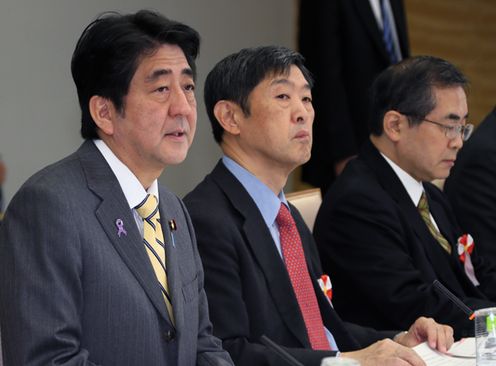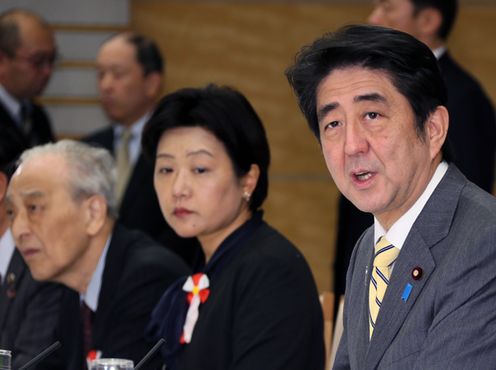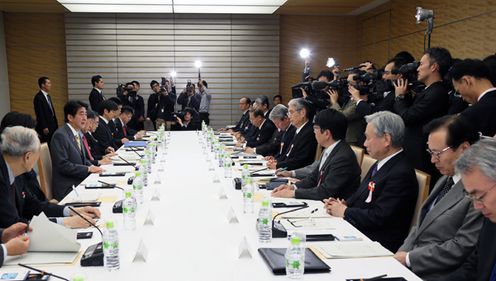Home > News > The Prime Minister in Action > November 2013 > Meeting of the Advisory Panel on Reconstruction of the Legal Basis for Security
Meeting of the Advisory Panel on Reconstruction of the Legal Basis for Security
Wednesday, November 13, 2013

Photograph of the Prime Minister delivering an address (1)

Photograph of the Prime Minister delivering an address (2)

Photograph of the Prime Minister delivering an address (3)
Prime Minister Shinzo Abe held the fourth meeting of the Advisory Panel on Reconstruction of the Legal Basis for Security at the Prime Minister's Office.
During the meeting, an exchange of views took place among the members in attendance.
The Prime Minister said in his opening address,
"I would like to express my appreciation to the distinguished members who have gathered here despite your busy schedules. At the previous meeting, discussion was made on examples of specific actions that Japan should take, which I believe was a very beneficial exercise also from the standpoint of furthering the understanding of the public. Today, following on from our previous meeting, I would like you to deepen discussion on how the Constitution should be interpreted, focusing in particular on the issues concerning the right of collective self-defense.
It is the responsibility of the Government to protect the lives of the Japanese people and the existence of Japan. What measures should be taken to do this? These are primarily policy decisions on foreign policy and defense. Japan is a constitutional government and a nation in which sovereignty resides with the people. In the Constitution, the preamble sets forth the 'right to live in peace.' Article 13 stipulates the 'right to life, liberty, and the pursuit of happiness.' Peace is what the people aspire towards. However, at the same time, the Constitution does not accept that the lives of the Japanese people, the people with sovereignty, and the existence of the state are placed in danger.
With regard to the right of collective self-defense, the United Nations (UN) Charter provides that UN member states have an inherent right of individual and collective self-defense. It goes without saying that under international law, Japan has a right of collective self-defense as a sovereign state. The international environment surrounding Japan has increased in severity, and new cross-border threats have been increasing, including terrorism and cyber attacks. Under these circumstances, incidents that threaten the lives, health, and property of the people or the existence of the state can occur anywhere in the world. In order to be able to work with other countries and take steps to cope with these difficult issues which cannot be dealt with by a single country alone, Japan must develop a carefully thought-out system, including a legal basis. I believe having a solid system in place that will thoroughly protect us against a range of possibilities will serve as a deterrent, and as a result, make these incidents less likely to occur.
Japan cannot enjoy peace alone. Furthermore, the security of Japan cannot be ensured through the efforts of Japan alone. The security of Japan can be ensured with greater certainty only if we work with our allies to protect each other, support each other, and jointly safeguard international order. As a responsible nation, we need to completely discard a mentality of dependence, a notion that we can only focus on our own affairs, entrusting other countries with maintaining and developing the peace and security of the world and the region. Furthermore, unless we make efforts to support public international order, Japan will not be able to earn respect from the international community, and we may even compromise our own security. Based on this recognition, I have presented the concept of 'Proactive Contribution to Peace,' that is, Japan should become a country that makes active contributions to world peace and stability more than ever before based on a belief in international cooperation. This concept has obtained the support of many countries.
Today, in order to examine what is necessary to protect the lives of the Japanese people and ensure the existence of the state amid the dramatic changes taking place in the security environment, and to realize peace and stability in the international community which constitute the foundation for the security of people and the existence of states, I look forward to another round of active discussion among the members of the Advisory Panel regarding interpretations of the Constitution that would be suitable for the new era. Thank you very much."


